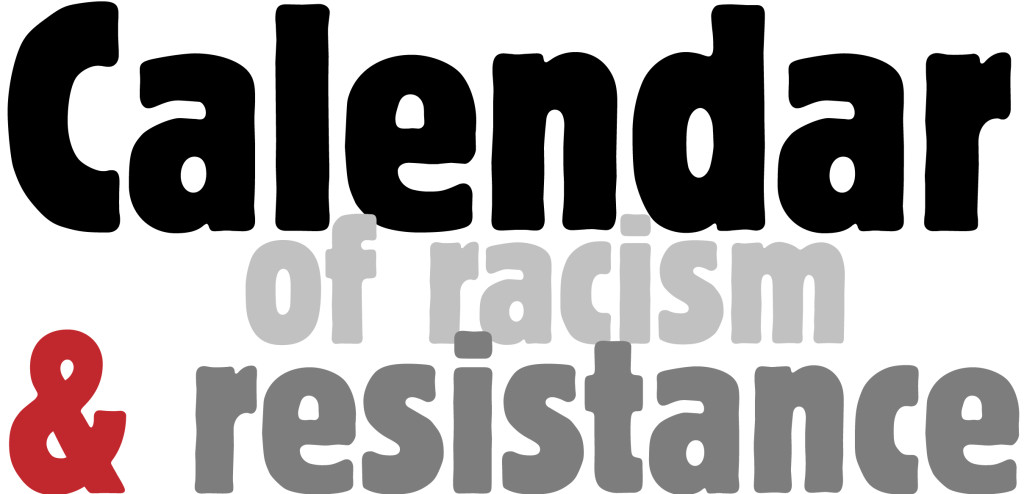A fortnightly resource for anti-racist and social justice campaigns, highlighting key events in the UK and Europe.
ASYLUM, MIGRATION AND CITIZENSHIP
REFUGEES AND THE CONFLICT IN LIBYA
7 June: In the context of renewed clashes around Tripoli, the UN human rights office says that 22 people have died of tuberculosis since last September at the Zintan facility south of Tripoli, and that some of the 2,300 people intercepted by the Libyan coast guard and returned to Tripoli since 30 April may have been sold into forced labour, sexual exploitation or to smugglers offering transit to Europe. (UN News, 7 June 2019)
ASYLUM AND MIGRANT RIGHTS
6 June: In an escalating row over judicial independence, Italian interior minister Matteo Salvini says he will ask the state attorney to examine whether three pro-migrant magistrates should have abstained from making rulings on immigration cases that contradicted anti-immigrant government policy. (Guardian, 6 June 2019)
7 June: German lawmakers pass a raft of laws on immigration and asylum, including a threefold increase in the maximum length of detention of single adult asylum seekers, measures lowering the threshold for detaining and deporting rejected asylum seekers, and some that incorporate skilled migrant workers into the labour market. (Info Migrants, 7 June 2019)
8 June: German media report that in April the Federal Office for Migration and Refugees accepted only 2 of 147 asylum applications from people granted protection in German churches, which provide a final refuge for those facing imminent deportation. (Deutsche Welle, 8 June 2019)
13 June: The European Court of Human Rights rules that the Greek government subjected 5 unaccompanied Afghan minors to inhuman and degrading treatment and violated their right to liberty and security. Entering in 2016, they were ordered to leave the country and subsequently detained in police stations without explanation. (Ekatherimini, 13 June 2019)
13 June: Continuing a trend since 2017, over 50 per cent of Home Office immigration decisions are being overturned by judges at immigration tribunals, with immigration lawyers saying media coverage is playing a significant role. (Independent, 13 June 2019)
17 June: The Home Office announces plans to resettle between 5,000 and 6,000 more of the ‘most vulnerable’ refugees from beyond the Middle East and North Africa by 2021, with the caveat that actual numbers will depend on factors such as the availability of accommodation. Campaigners call for the UK to accept 10,000. (Independent, 17 June 2019; Guardian 18 June 2019)
17 June: Campaigners criticise the Home Office after a Guardian investigation reveals that almost 40 per cent of Syrian asylum seekers between 2011 and 2018 were made to take ‘discredited’ language tests in order to prove their nationality, even in cases where documents had been issued. (Guardian, 17 June 2019)
BORDERS, TRANSIT ZONES AND INTERNAL CONTROLS
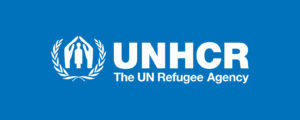 9 June: The UNHCR says that due to the lack of the NGO rescue ships and the increase in departures due to the conflict in Libya, the risk of migrants and refugees dying in the Mediterranean is the highest it has ever been and that ‘if we do not intervene soon, there will be a sea of blood’. (Guardian, 9 June 2019)
9 June: The UNHCR says that due to the lack of the NGO rescue ships and the increase in departures due to the conflict in Libya, the risk of migrants and refugees dying in the Mediterranean is the highest it has ever been and that ‘if we do not intervene soon, there will be a sea of blood’. (Guardian, 9 June 2019)
16 June: Italy’s interior ministry permits 8 migrants, including pregnant women, minors and sick men, to disembark from the German NGO vessel Sea-Watch 3 on Lampedusa. Over 40 migrants remain on board the vessel, which Salvini says could remain at sea ‘until New Year’ after he signed a decree banning its entry into Italian waters. (Deutsche Welle, 16 June 2019; Morning Star, 16 June 2019)
18 June: A new map that ‘documents and denounces’ the push-backs of migrants at the internal, external and externalised borders of Europe is launched, having been initiated by activist groups and individuals active in the Balkan corridor, which was closed to migrants in March 2016. (Push Back Map, 18 June 2019)
RECEPTION AND DETENTION
6 June: The Department of Justice & Equality in Ireland apologises after it emerges that Sylva Tukula, a transgender woman from South Africa who died at the all-male Great Western House Direct Provision Centre in Galway in August 2018, was buried last month without ceremony or prior notice to friends. Campaigners also criticise the governmant’s general lack of transparency around deaths in Direct Provision. (Irish Times, 6 June 2019; The Journal, 6 June 2019)
11 June: In response to the Italian interior ministry’s sudden decision to close the via Mattei reception centre in Bologna, local organisations and unions protest and help the roughly 140 migrants to relocate to other centres, preventing their removal to Caltanissetta in Sicily. (Peoples Dispatch, 14 June 2019)
12 June: The inquest into the death of Polish national Marcin Gwozdzinski in Harmondsworth immigration removal centre, near Heathrow, in September 2017 concludes that the premature closure of suicide and self-harm prevention procedures by untrained staff was the main contributing factor towards his death, possibly exacerbated by his prolonged detention of 9 months. (Inquest, 12 June 2019)
 14 June: A high court judge orders the government to establish a public inquiry into allegations of systemic abuse at G4S-run Brook House immigration removal centre, following a successful legal challenge by two victims who appeared in a BBC Panorama exposé in September 2017. It will be the first public inquiry into immigration detention in the UK. (Guardian, 14 June 2019)
14 June: A high court judge orders the government to establish a public inquiry into allegations of systemic abuse at G4S-run Brook House immigration removal centre, following a successful legal challenge by two victims who appeared in a BBC Panorama exposé in September 2017. It will be the first public inquiry into immigration detention in the UK. (Guardian, 14 June 2019)
16 June: Authorities in the Una Sana Canton in northwest Bosnia begin transporting migrants squatting in private accommodation in Bihac to a new centre in rural Vučjak, which the UN warns is unsafe because of the presence of landmines and potentially explosive methane gas, and the absence of sanitary facilities and electricity. (Sarajevo Times, 16 June 2019)
CITIZENSHIP AND STATUS
9 June: Immigration lawyers warn that the Home Office’s use of a secretive ‘streaming tool’ algorithm, used by the department to grade visa applications according to risk levels, could be discriminating against applicants on the basis of nationality and age. (Financial Times, 9 June 2019)
10 June: A government review reveals that over 1,350 migrants, including Gurkha families and Afghan servicemen in the British armed forces, were unlawfully forced to provide DNA evidence to the Home Office in support of their applications to live and settle in the UK, with some being rejected solely for failing to provide it. (Telegraph, 10 June 2019)
13 June: A report by The Unity Project and Deighton Pierce Glynn solicitors finds that the ‘no recourse to public funds’ (NRPF) policy disproportionately impacts women, pregnant people, disabled people and children, and that a majority of families living in poverty as a result of the policy have at least one British child. TUP says the policy ‘is creating second-class citizens, the majority of whom are BME.’ Read the report here. (Guardian, 13 June 2019)
17 June: It is revealed that since 2011, Home Office officials have required almost two in five Syrian asylum seekers to take a highly criticised language test, administered by private companies, to verify their country of origin. Syrians make up two-thirds of those required to take the language test. (Guardian, 17 June 2019)
CRIMES OF SOLIDARITY
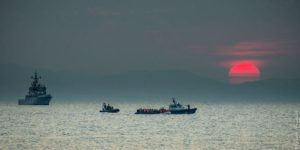 8 June: 60,000 people sign a petition calling on Italian authorities to drop criminal proceedings against Pia Klemp, the captain of migrant rescue vessel Sea-Watch 3 who may face up to 20 years in prison on top of fines. (Deutsche Welle, 8 June 2019)
8 June: 60,000 people sign a petition calling on Italian authorities to drop criminal proceedings against Pia Klemp, the captain of migrant rescue vessel Sea-Watch 3 who may face up to 20 years in prison on top of fines. (Deutsche Welle, 8 June 2019)
11 June: The Italian government adopts a decree threatening NGOs with fines between €10,000 and €50,000 and the permanent seizure of their vessel if they transport rescued migrants to Italian ports without authorisation. The decree gives Salvini’s interior ministry the power to order the NGOS to pay up. (Deutsche Welle, 11 June 2019)
RAIDS AND DEPORTATIONS
6 June: Migrant rights NGO La Cimade protests the French government’s decision to deport an Eritrean woman detained in Toulouse back to her country of origin, France’s first refoulement to the country, which is widely considered unsafe for those returned. (Info Migrants, 12 June 2019)
14 June: German regional interior ministers agree that the moratorium on deporting Syrians will be extended until the end of the year, while states deporting people to Afghanistan are permitted to continue doing so. (Info Migrants, 17 June 2019)
17 June: Some Irish garda immigration officers have travelled business and first class on deportation flights, with some fares exceeding €10,000, freedom of information requests reveal. (Irish Times, 17 June 2019)
ANTI-FASCISM AND THE FAR RIGHT
5 June: Youtube announce it is updating its hate speech policy and is banning white supremacist content on its video platform but ‘borderline’ cases (which it does not define) will be allowed. (New York Times, 5 June 2019)
7 June: Britain First leader Paul Golding is given a suspended sentence for distributing anti-migrant material in Ballymena, Northern Ireland, in October last year. (Irish News, 7 June 2019)
7 June: Two days before the fifteenth anniversary of the National Socialist Underground (NSU) Cologne nail bomb attack in the Turkish neighbourhood of Mülheim, neo-nazi flyers that warn of ‘imminent’ violence against ‘Muslims’ and claim to be published by the Attomwaffen Division, are delivered to homes in Mülheim. (Deutsche Welle, 7 June 2019)
11 June: French media report that police in the south-eastern city of Grenoble have charged five men from a neo-nazi cell who were developing a plot to attack Jewish or Muslim places of worship. (France 24, 11 June 2016)
14 June: Following international scrutiny, the Hungarian government withdraws its sponsorship of the far-right Felvidéki Hungarian Island festival in Slovakia organised by the Sixty-Four Counties Youth Movement. (Politico, 14 June 2019)
16 June: US President Donald Trump retweets British far-right commentator Katie Hopkins’ attack on Sadiq Khan’s ‘Londonistan’, adding that Khan is a ‘national disgrace’ whose mayoralty will make serious youth violence ‘only get worse’. Downing Street refuses to comment, but foreign secretary Jeremy Hunt says he ‘150 per cent’ agrees with the sentiment. (Guardian, 16 June 2019; Guardian, 17 June 2019)
17 June: German security sources say that a 45-year-old man suspected of the murder of the pro-migrant Kassel district president Walter Lübcke earlier this month is believed to have been imprisoned for attempting to bomb a refugee home in 1993 and to have links to the National Democratic Party, Combat 18 and other far-right and neo-nazi groups. (Guardian, 17 June; Deutsche Welle, 17 June 2019)
ELECTORAL POLITICS
5 June: In the Danish general election, the Danish People’s Party’s (DPP) share of the vote drops by half (8.7%) and the far-right Stram Kurs (Hard Line) fails to reach the 2% threshold for a parliamentary seat. The Social Democrats win the most seats having fought a nativist campaign promising tougher measures on immigration. (Guardian, 6 June 2019)
6 June: The Labour Party accuses the Brexit party of deploying a ‘racist trope’ by attributing its Peterborough by-election defeat to Labour’s reliance upon a mainly Pakistani vote in inner-city wards. Official police investigations into allegations of electoral malpractice are ongoing, though three out of five have already been dismissed. (Guardian, 6 June 2019; BBC News, 18 June 2019)
8 June: After publicly admitting he made a ‘mistake’ by indulging in cocaine over twenty years ago, Conservative party leadership candidate and former justice secretary Michael Gove MP is accused of hypocrisy for supporting punitive drug policies which result in disproportionate numbers of young black men being convicted. (Guardian, 8 June 2019)
12 June: Spain’s third-largest party, the centre-right Ciudadanos, agrees to a power-sharing arrangement with the far-right Vox party and the conservative People’s Party in the Madrid and Murcia regional parliaments. (Reuters, 12 June 2019)
14 June: Anti-immigrant and far-right MEPs across Europe form Identity and Democracy, the 73-strong largest group of far-right parties in the European parliament which will be led by Marco Zanni from the League in Italy. (Guardian, 14 June 2019)
17 June: Despite winning the first round, the far-right Alternative for Germany party, the main opposition to Angela Merkel’s Christian Social Democrats, fails to win its first mayoral seat in the eastern city of Görlitz in an election considered a test for the party’s future prospects. (BBC News, 17 June 2019)
18 June: During the televised Conservative leadership candidate debate, home secretary Sajid Javid calls for an independent investigation into Islamophobia within the party, with the other four candidates appearing to nod in agreement. (Guardian, 18 June 2019)
POLICE AND CRIMINAL JUSTICE SYSTEM
8 June: Hampshire Constabulary in southern England is criticised by The Monitoring Group for refusing to disclose information regarding the content of complaints made about 19 employees who have been under investigation for racist and homophobic language and behaviour since February. (Sky News, 8 June 2019)
8 June: The inspectorate of Scottish police warns that delays in holding inquiries into deaths in police custody are having a profoundly negative impact on bereaved families, with investigations into only 4 of 14 deaths since 2013 published. (The Scotsman, 8 June 2019)
11 June: Taha Bouhafs, the journalist who became famous for the photo of Alexander Benalla assaulting a protester, is himself assaulted by police, leading to a dislocated shoulder, and arrested whilst filming a protest of undocumented workers in the Parisian suburb of Alfortville. (CPJ, 18 June 2019)
14 June: The Head of the General Inspectorate of the National Police, France, Ms Julian releases a report ‘Policing of the Police’ that shows no suspensions in 2018 for police violence. The same day a video of a young social worker and ‘community mediator’, Boubacar Drame, being violently arrested in Gennevilliers (Paris), goes viral, the latest case highlighting the institutional violence of the police. (Mediapart, 17 June 2019)
NATIONAL SECURITY AND COUNTER-TERRORISM
14 June: Home Office data reveal that 41 per cent of terror-related suspects arrested in 2018-2019 were white – the highest percentage since March 2004. The number of Asian suspects dropped to 36.2%, its lowest percentage since 2006. (Independent, 14 June 2019)
EDUCATION
8 June: Academics in Britain say Home Office institutional racism is damaging British research projects by refusing visas to African researchers on arbitrary and ‘insulting’ grounds. (Guardian, 8 June 2019)
MEDIA AND CULTURE
11 June: Penguin rebuts charges of anti-Semitism against one of its authors, Pedro Baños, for his book How They Rule the World: the 22 Secret Strategies of Global Power, which features octopus tentacles on its cover. Rabbi Baroness Julia Neuberger is later asked to independently review the book, especially the imprint’s decision to cut 30,000 words from the English edition, including passages on the Rothschild family. (Guardian, 11 June 2019; Guardian, 17 June 2019)

13 June: A counterpoint to the de-contextualised Barca Nostra in Venice, the first UK exhibition focusing on migrant deaths in the Mediterranean, Sink Without Trace, opens at the P21 Gallery in London, displaying work from 18 artists from 10 countries, 7 of them refugees who crossed the sea to seek asylum. (Guardian, 13 June 2019)
14 June: The publisher of the Daily Mail pays £120,000 in damages plus costs to the humanitarian charity Interpal after Associated Newspapers apologises unreservedly for a piece in which it accused Interpal of funding a ‘hate festival’ in Palestine where it claimed the murders of Jews were acted out. (Guardian, 14 June 2019)
THE GRENFELL TOWER FIRE TWO YEARS ON
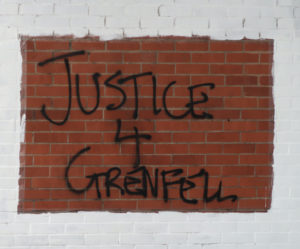
6 June: Emma Dent Coad, Labour MP for Kensington, claims that following the Grenfell Tower fire in June 2017 senior council officials treated the area with ‘racism or snobbery’, describing it as ‘little Africa’ and its people as ‘from the Tropics’. (Evening Standard, 6 June 2019)
10 June: Scotland Yard says police have identified potential suspects for offences of corporate manslaughter and gross negligence in relation to the Grenfell Tower fire, though charges are unlikely to be brought prior to the publication of the inquiry in 2021. (Guardian, 10 June 2019)
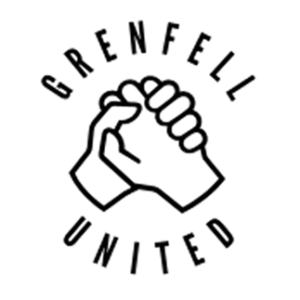 11 June: The families of victims and survivors of the Grenfell Tower fire launch one of the largest ever product liability legal cases against two US-based companies responsible for manufacturing the Tower’s cladding and insulation. Lawyers for the families say the materials were sold knowing they were flammable. (Guardian, 11 June 2019)
11 June: The families of victims and survivors of the Grenfell Tower fire launch one of the largest ever product liability legal cases against two US-based companies responsible for manufacturing the Tower’s cladding and insulation. Lawyers for the families say the materials were sold knowing they were flammable. (Guardian, 11 June 2019)
12 June: Grenfell United illuminates tower blocks in London, Manchester and Newcastle with projections drawing attention to the fact that two years after the Grenfell Tower fire such buildings are still not fitted with sprinklers, suitable fire doors or safe cladding. (Guardian, 13 June 2019)
HOUSING
4 June: Police evict around 200 migrants living in the ‘Five Star’ squat in Lille, northern France, which had been precariously squatted for over a year. Protesters form a human chain in front of the building, but the migrants amongst the squatters are removed to reception or detention centres. (France 3, 4 June 2019)
11 June: Serco, the private provider of asylum accommodation in Scotland, announces that it is restarting its lock-change policy to evict refused asylum seekers in Glasgow, just months after a legal challenge against the company was defeated. Glasgow city council responds warning of an ‘imminent homelessness crisis’. (Guardian, 12 June 2019)
EMPLOYMENT AND EXPLOITATION
12 June: Several hundred migrant activists from the Gilets Noirs and La Chapelle Debout groups occupy the headquarters of the catering multinational Elior Group in Paris’s La Défense district, accusing it of forcing them to work under the ‘threat of denunciation and deportation’. (RT France, June 12 2019)
14 June: In a report based on visits to seven cities and two detention centres in the UK, the UN’s special rapporteur on racism concludes that austerity has disproportionately impacted racial and ethnic minority communities, who are also discriminated against and excluded by ‘hostile environment’ policies. (Guardian, 14 June 2019)
14 June: The Maltese government announces the creation of a special ‘reporting unit’ to crack down on undocumented labour, with officials in charge of controlling residency and work permits, and inspectors given wide-ranging powers to inspect workplaces and accommodation. (Info Migrants, 14 June 2019)
RACIAL VIOLENCE AND HARASSMENT
10 June: After a 41-year-old man of African origin is viciously attacked and left with serious injuries while working at a discotheque in Palma, Spain, police arrest two German men identified by witnesses as neo-nazis. Images of the Ku Klux Klan and swastikas are found stored in their mobile phones. (Arablears, 10 June 2019)
10 June: The Valediction Memorial at Prague’s main railway station, which honours the escape of mostly Jewish children to Britain during World War II, is vandalised in an allegedly ‘carefully planned attack’ with a hammer and chisel or screwdriver. (Guardian, 10 June 2019)
10 June: Police appeal for information about a racist attack in April that left a man with a broken jaw in Cave Hill Country Park in northern Belfast, Northern Ireland. (Belfast Telegraph, June 10 2019)
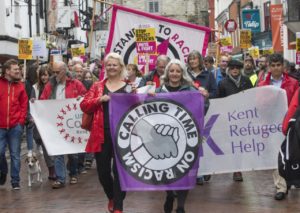
12 June: Hundreds march against racism in Canterbury, six days after a racist attack on 17-year-old Daniel Ezzedine, a German student of Lebanese descent in Canterbury on a school trip, left him in a coma, with severe head injuries. Racist attacks on children and young people in Kent are at a three-year high, according to NSPCC. (Kent Online, 12, 13 June 2019)
13 June: Police in Alghero, Sardinia, say that a 27-year-old Senegalese resident of the Vel Mari migrant reception centre was kicked and punched by two men in the street in a suspected racist attack. (Ansa, 13 June 2019)
16 June: Three years after the murder of pro-refugee MP Jo Cox by far-right local Thomas Mair in her Batley and Spen constituency, her sister warns that ‘brutal and toxic’ political discourse is in danger of being normalised, the lessons of her murder forgotten. (Independent, 15 June 2019)
This calendar was compiled by Joseph Maggs with help from Graeme Atkinson and the IRR News Team.

